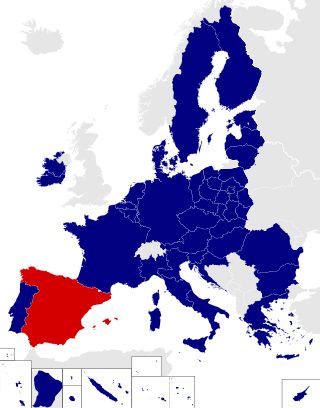Related Research Articles

The European Parliament (EP) is one of the legislative bodies of the European Union and one of its seven institutions. Together with the Council of the European Union, it adopts European legislation, following a proposal by the European Commission. The Parliament is composed of 705 members (MEPs). It represents the second-largest democratic electorate in the world, with an electorate of 375 million eligible voters in 2009.

The European People's Party Group is a centre-right political group of the European Parliament consisting of deputies (MEPs) from the member parties of the European People's Party (EPP). Sometimes it also includes independent MEPs and/or deputies from unaffiliated national parties. The EPP Group comprises politicians of Christian-democratic, conservative and liberal-conservative orientation.

Richard Graham Corbett CBE is a former British politician who served as the final Leader of the European Parliamentary Labour Party (EPLP), from 2017 to 2020. He was a Member of the European Parliament (MEP) for Merseyside West from 1996 to 1999 and then for Yorkshire and the Humber from 1999 to 2009, when he lost his seat, and again from 2014 to 2020. He attended Shadow Cabinet meetings and was a member of the Labour Party's National Executive Committee.

Jerzy Karol Buzek(listen) is a Polish politician and Member of the European Parliament from Poland. He has served as Prime Minister of Poland from 1997 to 2001, since being elected to the European Parliament in 2004, he served as President of the European Parliament between 2009 and 2012. He is married to Ludgarda Buzek and is the father of Polish actress Agata Buzek.

The president of the European Parliament presides over the debates and activities of the European Parliament. They also represent the Parliament within the European Union (EU) and internationally. The president's signature is required for laws initatied under co-decision and the EU budget.

The apportionment of seats within the European Parliament to each member state of the European Union is set out by the EU treaties. According to European Union treaties, the distribution of seats is "degressively proportional" to the population of the member states, with negotiations and agreements between member states playing a role. Thus the allocation of seats is not strictly proportional to the size of a state's population, nor does it reflect any other automatically triggered or fixed mathematical formula. The process can be compared to the composition of the electoral college used to elect the President of the United States of America in that, pro rata, the smaller state received more places in the electoral college than the more populous states.

Jens-Peter Rossen Bonde was a Danish politician who served as Member of the European Parliament (MEP) with the June Movement. He resigned as an MEP in May 2008. Bonde was elected to the European Parliament in the first election in 1979 with the People's Movement against the EU. He was re-elected 6 times consecutively. In 1992 he co-founded the June Movement which he chaired until his retirement in May 2008.

The 2009 European Parliament election was held in the 27 member states of the European Union (EU) between 4 and 7 June 2009. A total of 736 Members of the European Parliament (MEPs) were elected to represent some 500 million Europeans, making these the biggest trans-national elections in history. An additional 18 observers were pre-elected.

In general, the law of the European Union is valid in all of the twenty-seven European Union member states. However, occasionally member states negotiate certain opt-outs from legislation or treaties of the European Union, meaning they do not have to participate in certain policy areas. Currently, three states have such opt-outs: Denmark, Ireland and Poland. The United Kingdom had four opt-outs before leaving the Union.

Spain is a European Parliament constituency for elections in the European Union covering the member state of Spain. It is currently represented by 59 Members of the European Parliament and is the second largest European Parliament constituency in terms of geographic area after France, as well as the third most populated after Germany and France.

The seventh European Parliament was elected in the 2009 elections and lasted until the 2014 elections.

The European Conservatives and Reformists (ECR) is a soft Eurosceptic, anti-federalist political group of the European Parliament. The ECR is the parliamentary group of the European Conservatives and Reformists Party European political party (formerly known as the Alliance of Conservatives and Reformists in Europe or Alliance of European Conservatives and Reformists, but also includes MEPs from four other European parties and thirteen MEPs without European party affiliation.

The 2014 European Parliament election was the United Kingdom's component of the 2014 European Parliament election, held on Thursday 22 May 2014, coinciding with the 2014 local elections in England and Northern Ireland. In total, 73 Members of the European Parliament were elected from the United Kingdom using proportional representation. England, Scotland and Wales use a closed-list party list system of PR, while Northern Ireland used the single transferable vote (STV).
Article 50 was a Eurosceptic political party in the Netherlands. The party was founded by MEP Daniël van der Stoep in 2012. The name refers to article 50 of the Lisbon Treaty, of which the first sentence is "Any Member State may decide to withdraw from the Union in accordance with its own constitutional requirements", as well as article 50 of the Constitution of the Netherlands, which states that "[t]he States General shall represent the entire people of the Netherlands." On 27 January 2015, the party merged into For the Netherlands, and therefore Article 50 ceased to exist.
References
- ↑ Resigned in 2011, replaced by María Auxiliadora Correa Zamora on 13 January 2012.
- ↑ Resigned in 2011, replaced by Juan Andrés Naranjo Escobar on 13 January 2012.
- ↑ MEP since the Lisbon Treaty.
- ↑ MEP since the Lisbon Treaty.
- ↑ Resigned in 2010, replaced by Sergio Gutiérrez Prieto on 19 July 2010.
- ↑ Resigned in 2010, replaced by María Irigoyen Pérez on 16 November 2010.
- ↑ MEP since the Lisbon Treaty.
- ↑ MEP since the Lisbon Treaty.
- ↑ Resigned in 2011, replaced by Ana Miranda Paz on 1 January 2012, herself replaced by Iñaki Irazabalbeitia in July 2013.